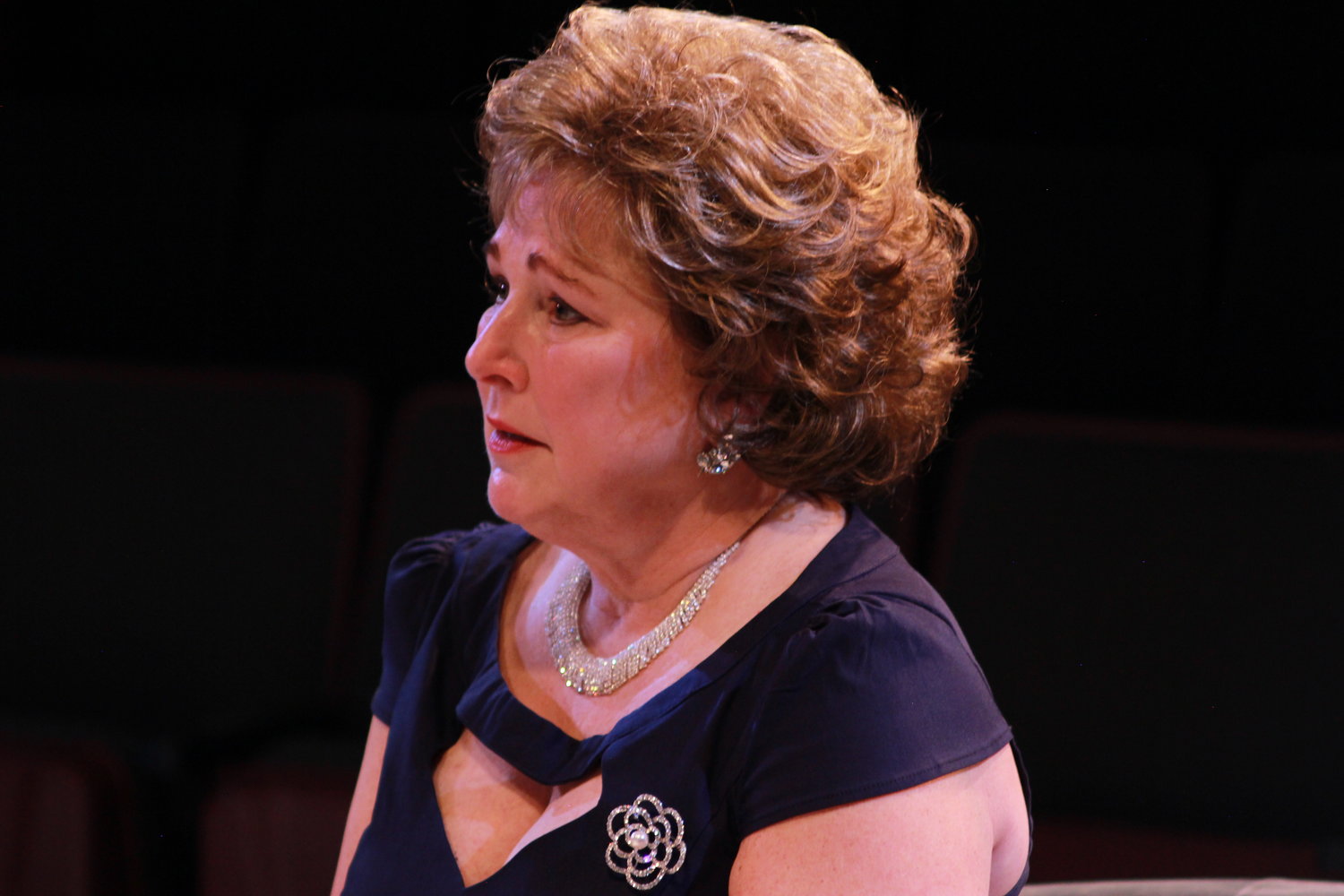Review of Steel Magnolias, Music Theatre of Connecticut
The first thing to take in about the production of Steel Magnolias at Music Theater of Connecticut is how Jessie Lizotte’s set design has opened up the playing space, creating a beauty salon with several work areas, a reception desk, a waiting area, a hair dryer, and two doors, one inner and one to the outside. The shop is run by Truvy (Raissa Katona Bennett) in what was formerly a carport on her property and it provides an isle of sanity for a coterie of women in the town who drop in regularly to get their hair done and to chat about whatever might be going on in the town of Chinquapin, Louisiana.
Directed by Pamela Hill, this fine ensemble cast captures the rhythms of everyday talk in Robert Harling’s script and the movements about the shop, as side conversations and common discussions join, overlap or conflict, is vividly enacted. Which is a good thing because all the action takes place in the shop and it’s important we feel as at home there as these women do. There’s nothing claustrophobic or phony about Truvy’s. It is an impressive and effective space in which to watch this discursive comedy-drama unfold.
M’Lynn (Kaia Monroe), Annelle (Rachel Rival), Truvy (Raissa Katona Bennett), Shelby (Andrea Lynn Green) in MTC Mainstage production of Steel Magnolias (photo by Heather Hayes)
Taking place in two Acts, each with two scenes, the play’s chattiness provides a context for four key moments in the life of Shelby Eatenton (Andrea Lynn Green), the daughter of M’Lynn (Kaia Monroe) who is one of the mainstays at Truvy’s, along with Clairee Belcher (Cynthia Hannah), widow of the late mayor, and Ouiser Bourdeaux (Kirsti Carnahan), the local curmudgeon. In the first scene, we see preparations for Shelby’s marriage that afternoon and meet, as do the women, Annelle Dupuy-DeSoto, a new hairdresser Truvy hired more from pity than need. The young woman, it emerges, has been abandoned by her husband and is living at a rooming-house. Soon she is welcome as one of group, and changes in her status—from abandoned to engaged to expectant mother—mark the passage of time over the course of the play.
Clairee (Cynthia Hannah), foreground, Annelle (Rachel Rival), Ouiser (Kirsti Carnahan), background in MTC Mainstage production of Steel Magnolias (photo by Heather Hayes)
In that first scene we learn that Shelby has diabetes when she undergoes a hyperglycemic episode, which is dramatic but easily coped with. The main tension seems to be between Shelby’s “get on with life” attitude and her mother’s pricklier concerns. Monroe makes M’Lynn seem something of a wet blanket, more apt to be gently sarcastic rather than merry. The merriest is Clairee, who will do just about anything to get a rise out of Ouiser, her foil. Carnahan and Hannah do a lot to keep things lively. As Truvy, Bennett’s Dolly Parton-style hairdo makes her look brassier than she is; there’s a genuine openness in her dealings with Rachel, who, as played by Rival, is very sweet but not that bright. The main figure is Shelby, and Andrea Lynn Green, who played the cunning Maggie the Cat in MTC’s sharp Cat on a Hot Tin Roof last season, plays her as a young woman with a lot on her mind, clearly used to being the young one doted on by these older ladies. The big reveal at the end of Act One shows us that she will live her own life, even if it kills her.
Shelby (Andrea Lynn Green) in MTC Mainstage production of Steel Magnolias (photo by Heather Hayes)
In Act Two we learn of the consequences of Shelby’s decision to have a child despite her doctor’s warnings and against M’Lynn’s wishes. The first scene of Act Two, a year and a half since the end of Act One, seems to mark life as usual, except that Shelby, as everyone learns to their shock and concern, needs her mother in a very particular way, and that creates a spotlight for M’Lynn as she continues to be essential in her daughter’s life. Green makes Shelby’s exit touching as she manages to think of others while facing major surgery. The final act gives M’Lynn the focus as she has to accept her daughter’s outlook and believe it is for the best. Monroe keeps M’Lynn tightly wound so that her breakdown is the more powerful, the kind of letting go and recovery that only happens with trusted friends.
Truvy (Raissa Katona Bennett), M’Lynn (Kaia Monroe) in MTC Mainstage production of Steel Magnolias (photo by Heather Hayes)
Steel Magnolias is noted, I suspect, for its ability to bring out tears and hankies. Truvy says that one of the best emotions is “laughter through tears” and that’s the feeling the play aims for. While only M’Lynn and Shelby are family, these six women provide a family-like space for each other, a context of wisecracks and pep-talks and shared confidences that allows for both laughter and tears. M’Lynn, who the others think of as tough, can only go so soft; Clairee, the joker, has to find something to make the others laugh; Ouiser, who has “been in a very bad mood for forty years,” can’t go too touchy-feely. It’s a fine line of playing as cast in the little company they have created, with Truvy as the one who, no matter what’s going down, has to help the ladies find a look to meet it with. It’s a play about life, loss, love, and the importance of familiar routine played to perfection with this perfectly chosen cast.
Steel Magnolias
By Robert Harling
Directed by Pamela Hill
Scenic Design: Jessie Lizotte; Lighting Design: RJ Romeo; Costume Design: Diane Vanderkroef; Sound Design: Will Atkin; Prop Design: Merrie Deitch; Hair Design: Peggi De La Cruz; Stage Manager: Jim Schilling
Cast: Raissa Katona Bennett, Kirsti Carnahan, Andrea Lynn Green, Cynthia Hannah, Kaia Monroe, Rachel Rival
Music Theatre of Connecticut
November 8-24, 2019









